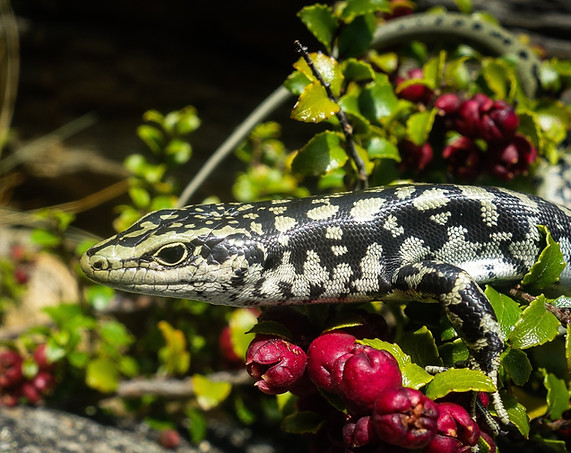Home > Our lizards > Otago skink
Otago skink
English name: Otago skink
Scientific name: Oligosoma otagense
Conservation status: Nationally endangered
Found: Central Otago. Western range Lindis-Lake Hawea, eastern range Macraes Flat - Middlemarch. Previously more widespread throughout Central Otago
Did you know: They can grow as long as the average man’s forearm.
%20copy.jpg)
Otago skink. Carey Knox
The Otago skink is a striking lizard. It’s one of the largest of New Zealand’s lizards, with a SVL of up to 130mm and a total length up to 300mm. It is distinctively patterned from head to tail with large blotches of pale yellow or gold on very dark brown or black. The blotches can join together on the tail, making it almost completely pale. Its eyes are black and its underside cream with black flecks. Its tail is noticeably long and tapering.

Otago skink. Carey Knox
It lives on the schist rock tors of Central Otago where it inhabits crevices and fissures. When conditions are good it sun basks at crevice entrances or out on the rock faces. The diet of the Otago skink is made up of invertebrates such as flies, moths, weta, dragonflies and beetles, as well as soft fruit such as berries. It will also eat smaller lizards. When this sizeable lizard is actively foraging it will sneak up and then pounce on it’s prey, snapping it in its wide jaws. It is an important seed distributor for the native divaricating shrubs such as Coprosma, Corokia and especially the porcupine shrub Melicytus alpinus. It’s a reasonably social lizard, and often spends time in male-female pairs and family groups. However it is very territorial towards other lizard species, and for example will not want to share a rock tor with grand skinks.
Otago skinks are very long lived, and can reach forty years or more. They are also rather slow to breed, reaching sexual maturity at 4 -6 years and having 1 - 4 offspring once a year, or sometimes only once every two years.

Otago skink. Carey Knox
SVL: Snout to vent length. A measurement of size taken from the tip of an animal's nose to the opening of the cloaca (the combined excretory and genital opening) at the base of the tail. It is the common length measurement used for lizards.
Hitchmough, R. et al. (2015). Conservation Status of New Zealand Reptiles 2015. New Zealand Threat Classification Series 17. Department of Conservation. Wellington, NZ.
https://www.doc.govt.nz/Documents/science-and-technical/nztcs17entire.pdf
van Winkel et al. (2018). Reptiles and amphibians of New Zealand: A field guide. New Zealand: Auckland University Press.
